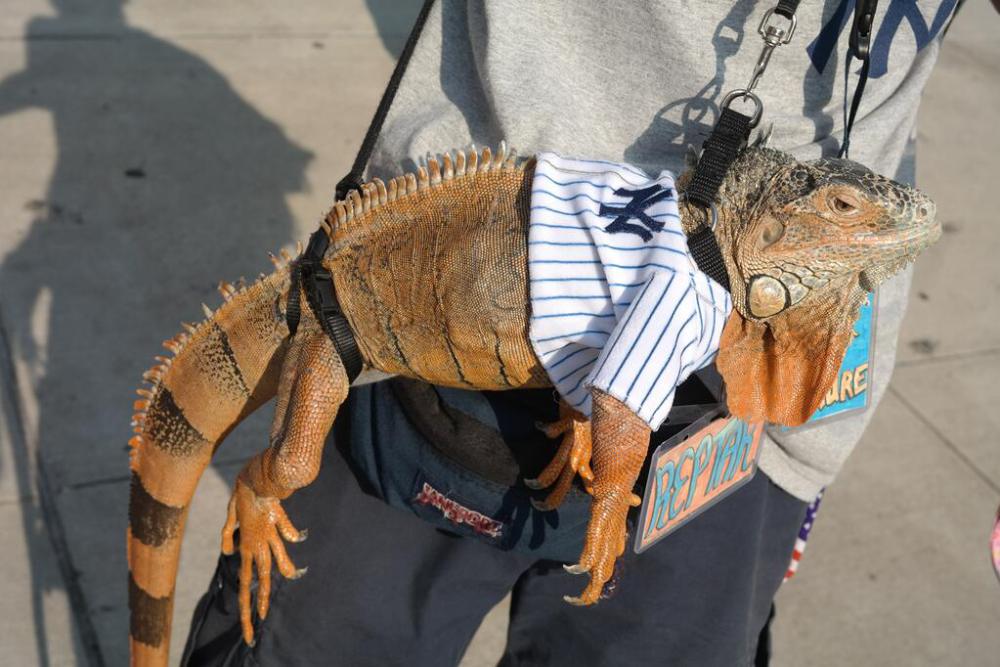Their ancient primitive bodies soak up the subtropical heat in desert cactus hills or along the humid grapefruit coast.
They come by the tens of thousands, from near and far. No one really knows how many there are or where each odyssey begins. Iguanas young and old join this annual ritual, but the old outnumber the young by a huge margin. Their ancient primitive bodies soak up the subtropical heat in desert cactus hills or along the humid grapefruit coast.
Lizard skin hangs in folds from their jaws. Their hooded lids blink in the blinding sunshine their bodies seem to crave. Unlike their tropical vegetarian cousins these northern species are omnivorous. They will eat almost anything, including nachos, hot dogs, and kettle corn.
Buddha Ball brings them back year after year, an instinctual beckoning in their blood near winter’s end. Buddha Ball closely resembles baseball, but with a philosophical dimension of non-attachment.
Also known as Spring Training, Buddha Ball features a number of players who are destined to disappear. Sometimes their names are not printed on their jerseys. Or several players on the same teams may wear the same number. The message is clear. Survival of the fittest. All things — even you — must pass.
Buddha Ballpark scoreboards often say simply “Guest” and “Home,” since none of the teams who play in these stadia actually reside there and all of them will soon be gone. Older iguanas, wise in the ways of non-attachment, embrace the transience of these annual rituals.
Buddha Ball scores are noted and then forgotten. They do not figure in the official statistics of the season. This is because the teams on the field are not really the ones whose names they bear. You could call it Maya Ball.
An endless stream of substituted players flitter through the games like mayflies for their moments in the sun. These ephemeral rites of spring are but a harbinger of a summer yet to come, a prelude that turns instantly into the past, never to be heard from again.
Though brief and trackless, Buddha Ball does have a significant impact. It matters especially to the youngest players on these fields, who may ascend to the gladiatorial grandeur of the Major Leagues or slip back into the purgatory of the minors from whence they came or disappear forever into the special oblivion reserved for wannabes and never weres.
Teams nominally win or lose, but it’s the fates of individual players that determine the drama. Ultimately, it’s every man — however nameless or numberless — for himself. Buddha Ball is The Hunger Games writ mild and bloodless, a modern American culling of the sporting herd. May the odds be ever in your face!
Iguanas appreciate the lower prices and smaller arenas of Buddha Ball, compared to modern urban baseball citadels.
Iguanas appreciate the lower prices and smaller arenas of Buddha Ball, compared to modern urban baseball citadels. They will never be as close to the action for so paltry a cost again all season. Iguanas know “there’s no such thing as a bad seat at spring training,” even the bleachers, which may be picnic grass.
And what do these wily reptiles see from their intimate vantage point? A comedy (or not) of errors. Dropped balls, overthrows, flubs, balks, collisions, inside-the-park home runs, and blatant bobbling of every sort. Spring training yields an encyclopedia of unusual and unlikely baseball unavailable during the more professional, clockwork play of the regular season. You could wait a TV baseball lifetime for the zaniness that may occur in one Buddha Ball contest.
In this interface of the major and minor leagues, there are no pitchers’ duels. Each squad tries out as many pitchers as they can. Spring training games tend to be slugfests, with scores more characteristic of football. The final tally of today’s game for instance was 7 to 6. I forget who won.
Iguanas tend to be more knowledgeable and relaxed than the average baseball fan, though the players — fighting for their professional lives — are often more tense. When the announcer touts a team’s lineup, only the very young and very old still cheer. Everyone in between understands that players are loyal only to their contracts, not to any city or team.
“Team loyalty” in professional sports is as quaint and outdated a concept as “good government” in civilian life. These boys aren’t from the neighborhood. They live in gated communities far away. Iguanas know that what’s worth cheering for are great plays, not billion-dollar franchises.
As spring buds bloom and die, to let the fruits and leaves of summer grow and ripen, so does Buddha Ball flare brightly and disappear, yielding to baseball’s endless summer. Many iguanas will attend regular season games in their home towns, with varying degrees of pleasure. But not with the same ardor of their exotic, surprising, winter-busting treks to Buddha Ball.
James McEnteer travels north to Buddha Ball from his home in Ecuador. Read more of McEnteer’s articles on The Rag Blog.
[James McEnteer is the author of Shooting the Truth: the Rise of American Political Documentaries (Praeger). He lives in Quito, Ecuador. ]




















Love the story, Mr. McEnteer seems to hit it right on the nose, squared it up.